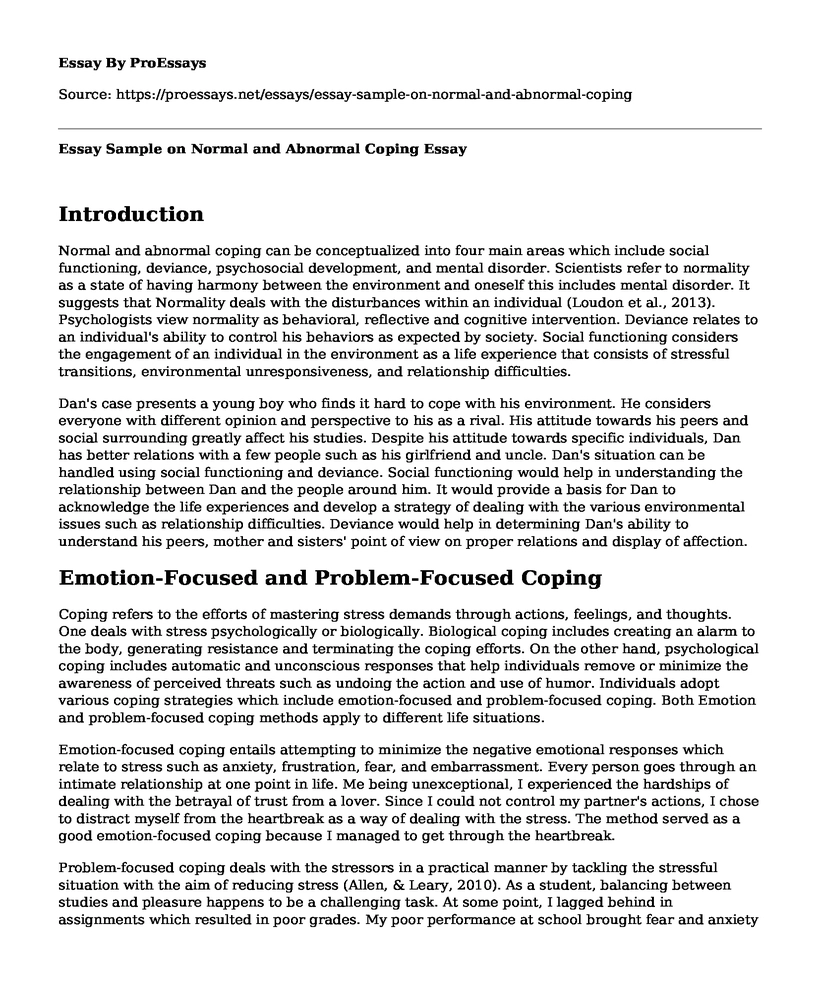Introduction
Normal and abnormal coping can be conceptualized into four main areas which include social functioning, deviance, psychosocial development, and mental disorder. Scientists refer to normality as a state of having harmony between the environment and oneself this includes mental disorder. It suggests that Normality deals with the disturbances within an individual (Loudon et al., 2013). Psychologists view normality as behavioral, reflective and cognitive intervention. Deviance relates to an individual's ability to control his behaviors as expected by society. Social functioning considers the engagement of an individual in the environment as a life experience that consists of stressful transitions, environmental unresponsiveness, and relationship difficulties.
Dan's case presents a young boy who finds it hard to cope with his environment. He considers everyone with different opinion and perspective to his as a rival. His attitude towards his peers and social surrounding greatly affect his studies. Despite his attitude towards specific individuals, Dan has better relations with a few people such as his girlfriend and uncle. Dan's situation can be handled using social functioning and deviance. Social functioning would help in understanding the relationship between Dan and the people around him. It would provide a basis for Dan to acknowledge the life experiences and develop a strategy of dealing with the various environmental issues such as relationship difficulties. Deviance would help in determining Dan's ability to understand his peers, mother and sisters' point of view on proper relations and display of affection.
Emotion-Focused and Problem-Focused Coping
Coping refers to the efforts of mastering stress demands through actions, feelings, and thoughts. One deals with stress psychologically or biologically. Biological coping includes creating an alarm to the body, generating resistance and terminating the coping efforts. On the other hand, psychological coping includes automatic and unconscious responses that help individuals remove or minimize the awareness of perceived threats such as undoing the action and use of humor. Individuals adopt various coping strategies which include emotion-focused and problem-focused coping. Both Emotion and problem-focused coping methods apply to different life situations.
Emotion-focused coping entails attempting to minimize the negative emotional responses which relate to stress such as anxiety, frustration, fear, and embarrassment. Every person goes through an intimate relationship at one point in life. Me being unexceptional, I experienced the hardships of dealing with the betrayal of trust from a lover. Since I could not control my partner's actions, I chose to distract myself from the heartbreak as a way of dealing with the stress. The method served as a good emotion-focused coping because I managed to get through the heartbreak.
Problem-focused coping deals with the stressors in a practical manner by tackling the stressful situation with the aim of reducing stress (Allen, & Leary, 2010). As a student, balancing between studies and pleasure happens to be a challenging task. At some point, I lagged behind in assignments which resulted in poor grades. My poor performance at school brought fear and anxiety because I was worried about my future. I managed to reduce my stressor, poor performance, by practicing proper time management that applied both in school and at home.
Conclusion
From the two different life situations, emotion-based coping deals with situations which one cannot control the stressor while problem-focused coping applies when an individual can directly deal with the stressor. Problem-focused coping requires taking control of the stressor and changing the situation through acting on the environment. Emotion-focused coping deals with the stressor through avoidance, vigilance or understanding the environment.
References
Allen, A. B., & Leary, M. R. (2010). SelfCompassion, stress, and coping. Social and personality psychology compass, 4(2), 107-118.
Loudon, D. L., Stevens, R. E., Yow, D. A., Humphrey, J. H., & Bowden, W. W. (2013). Stress in college athletics: Causes, consequences, coping. Routledge.
Cite this page
Essay Sample on Normal and Abnormal Coping. (2022, Dec 08). Retrieved from https://proessays.net/essays/essay-sample-on-normal-and-abnormal-coping
If you are the original author of this essay and no longer wish to have it published on the ProEssays website, please click below to request its removal:
- Psychiatric Disorders: Reflection Questions
- Problem Solution Proposal: Suicide in Japan
- Truth as a Philosophical Concept Essay
- Washington v. Glucksberg Case Analysis Essay
- Identification and Evaluation of Normative Leadership Theory Paper Example
- Essay Sample on Mental Illness & Gun Laws: Designing & Rulemaking for Implementation
- Paper Example on Personality Perspectives: Evaluating Research on Human Behavior







